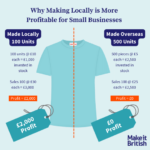At the core of every business is a successful product that’s known for its quality, value, and reliability. Product sourcing has the power to make or break any business. Small businesses must circumvent the vast ocean of the global marketplace to find reputable sources while ensuring profit margins spark a fervent, alluring glow.
What is Product Sourcing?
Every business needs to have its inventory, of course. These inventories are built on the foundation of good Product Sourcing. Product sourcing refers to the process of finding and acquiring goods from suppliers to fulfill the needs of a business. This process of procuring might vary from one business to the next, but the idea is always the same: seeking out reliable manufacturers and suppliers to attain the highest quality products at the lowest price!
Importance of effective product sourcing for small businesses
Effective product sourcing is crucial for small businesses as it directly impacts their success and competitiveness in the market. By sourcing products efficiently, small businesses can:
- Ensure access to high-quality goods that meet customer needs and expectations.
- Control costs by finding suppliers offering competitive prices and favorable terms.
- Build strong relationships with reliable suppliers, fostering trust and collaboration.
- Adapt to changing market conditions and maintain flexibility in their operations. Overall, effective product sourcing enables small businesses to remain competitive, efficient, and responsive to customer demands.
Sourcing Tips for Small Business
Below, we’re sharing some essential strategies for finding products and establishing sustainable small-business product sourcing. As a newbie in the field, these tips are your lifeboats in the vast ocean of sourcing!
1. Understand Your Product Needs
As a small business, your success solely relies on understanding your needs. A clear outline of the specific features and characteristics of the product is crucial. Businesses must count on every aspect such as size, shape, material, or functionality of the product before sourcing for it.
Quality, quantity, and pricing are key factors to consider when sourcing products for your small business. As a startup, you need to balance the quality of your product with affordability. Determine the number of products needed to fulfill demand without overstocking or facing shortages.
To ensure the best, research is the key tool for businesses. Understanding market demand and trends is important to making informed product sourcing decisions. Assess the popularity of items you want to sell. Think about your target audience and identify industry trends by analyzing your competitors. Your thorough research will give you a thriving edge in a competitive market.
2. Reach Out to Suppliers
Once you have identified your product, it’s time to seek for reliable suppliers. In today’s digital age, online resources and directories offer a wealth of information to help you find potential suppliers for your products. Businesses can utilize search engines, industry-specific directories, and B2B marketplaces to discover a wide range of suppliers catering to their needs. These platforms allow you to meet manufacturers and sourcing agents worldwide.
Look for events hosted by strategic sourcing companies or product sourcing agencies where you can meet manufacturers, sourcing agents, and procurement professionals. This strategy will help you reach out to the most reliable Sourcing channel for your business.
3. Assess Supplier Reliability
Before entering into a partnership with a supplier, always assess for its reliability! This offers you a first-hand look into what a future relationship with a given supplier might look like. Consider the following as you go through the process:
- Did they meet or exceed your expectations?
- Did the item get to you promptly?
- How was the communication?
- Was the quoted price point accurate?
A good working relationship with a supplier directly impacts the operations of your business.
3. Negotiate Favorable Terms
When talking with suppliers, try to get a fair price that matches what others are paying. To get a good price, always conduct thorough market research and ask for a good deal that fits your budget. As a small business, managing your budget is key for your survival. See if you can pay for things in a way that works best for you. Negotiate terms that accommodate your cash flow cycle, such as extended payment deadlines or installment options.
Additionally, explore opportunities for volume-based discounts. Sometimes, if you buy in huge, you can get a discount. See if you can buy more at once to save money. Also, check if you can get a better deal if you buy regularly from the same source.
4. Find the Right Sourcing Partners
Teaming up with a sourcing and procurement company can simplify the process of sourcing, purchasing, and supplier management for small businesses. Product sourcing companies or agents work as middlemen having established relationships with a range of factories and sourcing manufacturers. These agencies offer support to businesses by communicating directly with your manufacturers, helping with quality control, and checking on the production process for you.
When it comes to small businesses, local sourcing works best. Work with individual makers or sellers or partner with existing companies with their production lines. The idea is that the closer a supplier is located to your business, the quicker your deliveries will be and the less you pay in transportation costs.
5. Diversify Your Sourcing Strategy
Diversification is a risk control strategy that ensures a steady supply of products. As a newbie business, you can’t afford interruption in managing your inventory. You can work with wholesalers, or any sourcing company from the USA for instance, to open doors of opportunities for your business. Meanwhile, you can also hire a sourcing manufacturer as sourcing products from manufacturers is often cheaper.
Having a ready-to-go list of backup suppliers empowers businesses to swiftly switch suppliers to avoid any downtime or disruptions. The more you diversify the more control you have over your business. A resilient supply chain is essential to keep your business thriving. Flexible contracts with suppliers, maintaining buffer stock, and proactive planning to anticipate and diminish potential disruptions.
6. Build Strong Relationships
Effective communication is the cornerstone of any strong relationship. It’s important to share information openly and clearly with your suppliers, sourcing manufacturers, and sourcing partners. No matter if you are working with a global product sourcing company or leveraging any e-commerce product sourcing, be clear and honest about your expectations, requirements, and challenges. With trust and open communication, businesses can build strong relationships and drive collective growth and success.
Final Thoughts
Before purchasing and building up your inventory, it’s important for small businesses to make sure getting the best items at the lowest possible price point. For small businesses, well-executed product sourcing can bring a competitive advantage. Businesses that conduct market research before sourcing out always stay abreast of competition. Leveraging reliable sourcing partners with open communication and mutual respect opens the doors of future success for small businesses.
By understanding these basics, small businesses can establish a strong sourcing foundation that can make them thrive in a competitive marketplace.








